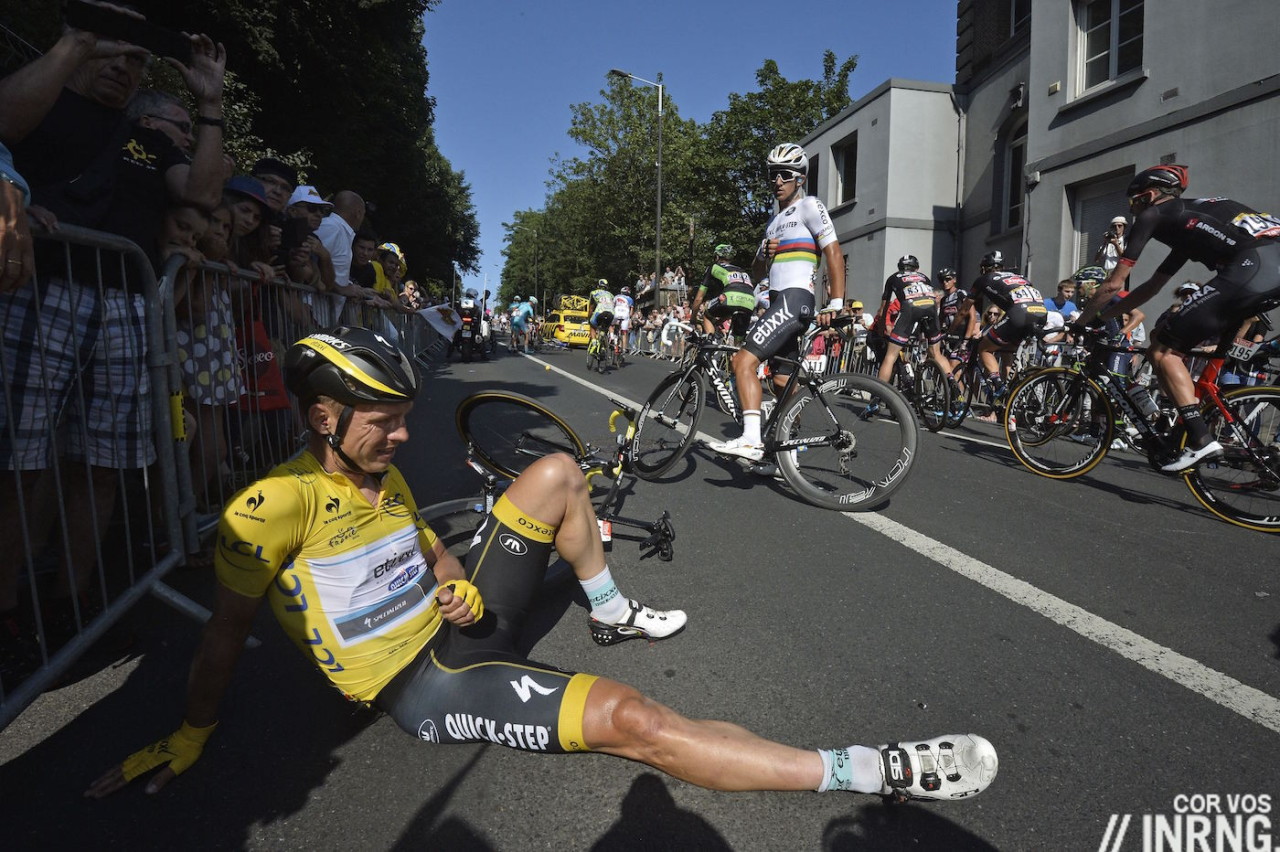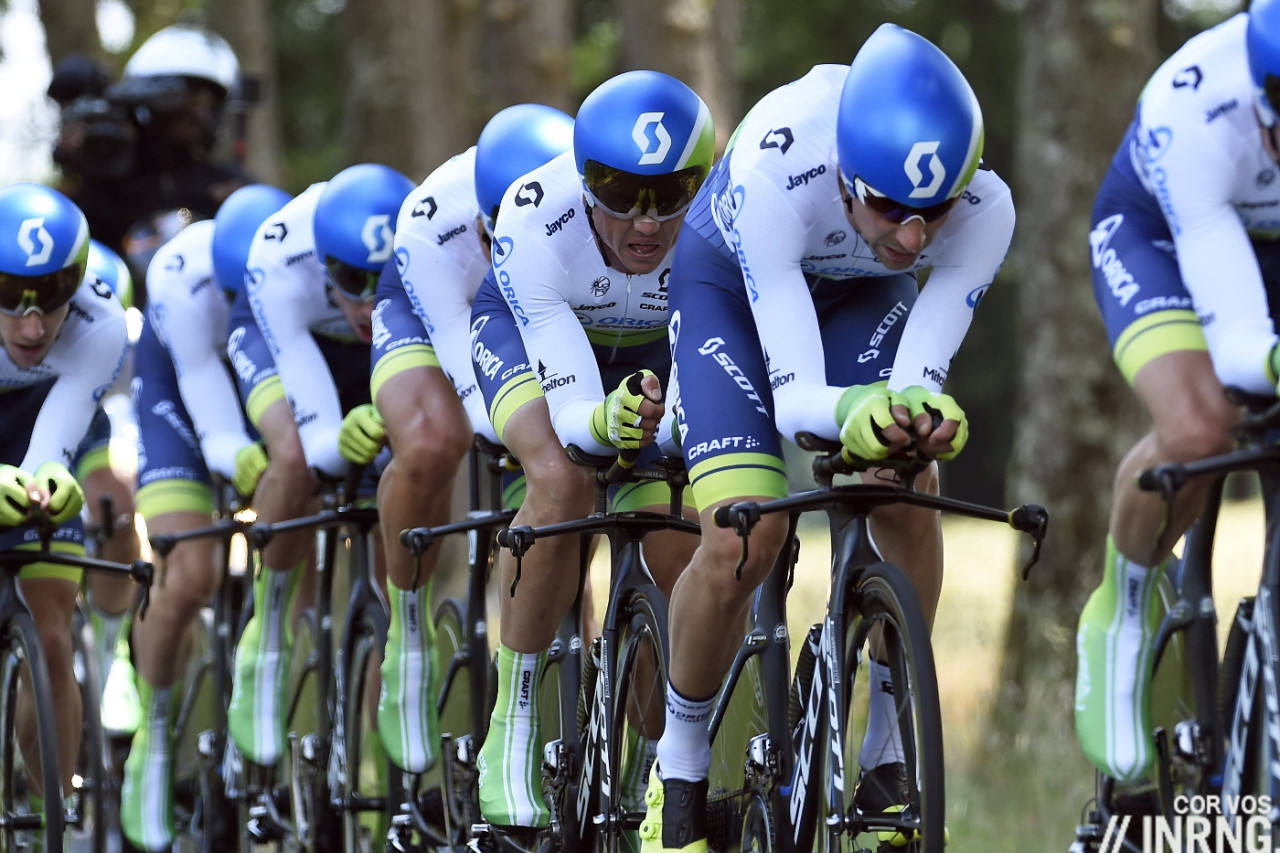Cycling is an individual sport conducted with teams. Except today where it becomes a team sport and the best rider in the peloton is only as good as the fifth rider on their team. It crosses a subtle line.

There’s a philosophical and moral aspect to it all. Philosophical in how we conceive a sport where the individual general classification has primacy yet today no matter how strong the leaders may be their result is only as good as their fifth placed rider. Yes cycling is a team sport too, all week we’ve seen Astana, BMC Racing, Team Sky and Tinkoff-Saxo riding in formation with the leader sat at the back but it’s different today, it’s direct. In normal stages a the team leader must have their wits about them, as imposing as some teams may be they must still fight for their own position; a rider from another team can sit on, literally free-riding off the efforts of these teams. It’s this latter point which introduces the moral concept, a good rider from a small team can still try to hold their own when the big teams try to dominate the race. Think of the cobbled stage to Cambrai where the likes of Bauke Mollema (Trek Factory Racing), Mathias Frank (IAM Cycling), Jean-Christophe Péraud and Romain Bardet (Ag2r La Mondiale) were able to stay with the front group while dominant teams tried to rip things up.
“Big teams” means big budgets. Squads like Team Sky and BMC Racing have monetary muscle and can hire accordingly to fill the gaps with strong riders on substantial, six-figure, salaries. Bretagne-Séché manager Emmanuel Hubert has said the ninth man on these squads could be the leader in smaller squads like his. As such the team time trial result probably correlates with team budget, a test of finances as much as formation. At least the time is taken on the fifth rider and not the ninth.

Smaller teams can mitigate this. A cohesive team of well-drilled riders is better than nine dumb superstars. Orica-Greenedge have won stages thanks to practice and a core roster of team pursuit and time trial specialists, outgunning squads of twice their budget. Garmin-Cervélo did it in 2011 and 2001 the artisan outfit of Crédit Agricole battled big pharma to win the stage ahead of ONCE, Festina, US Postal, Kelme and Rabobank, Telekom and Cofidis. But these are the exceptions and money always helps, the likes of BMC and Sky can block book time in windtunnels, hire consultants and hold TTT training camps.

Orica-Greenedge’s chances have been binned thanks to abandons and crashes. The worry has been that a TTT so late into the race would make the result dependent on random factors like crashes during the opening week. But had today’s stage happened on Stage 5 the Australian team would have ridden without Simon Gerrans and Daryl Impey and Michael Matthew’s injuries would have been more raw. Etixx-Quickstep’s chances are reduced though because of Tony Martin’s exit on Stage 7. You can’t legislate against bad luck but you can try though. This year’s race is unusually late into the Tour. Typically a TTT has arrived on Stage 4 or 5 in the past, now it’s Stage 9. Normally it’s against the rules, presumably because the longer the race goes on the risk of daily decimation. Here’s the UCI rulebook:
2.6.003 Team time trial stages shall take place during the first third of the race.
It’s another woolly UCI rule because “first third” isn’t defined. Still we’re at Stage 9 out of 21 so that’s past one third. We’re on the ninth day of 23 which is past one third and the race has done 1348km which is 40% of the distance. There was talk of a derogation for this, presumably it’s happened.
FAQ
One of the most regularly asked questions this week has been “What happens if a team has less than 5 riders in the TTT?“. The answer is that the team or even a lone rider still has to complete the course and make the time cut (winnning time plus 30%). Reuters journalist put the question to race director Thierry Gouvenou:
#tdf2015 race director Thierry Gouvenou says time of last rider to cross the line will count in TTT if team starts with less than 5 riders
— Julien Prétot (@julienpretotRTR) July 9, 2015
Summary
Today’s team time trial falls unusually late in the race. There had been concerns that results could depend on misfortune suffered between Utrecht and Brittany but if Orica-Greenedge and others have taken a pasting arguably they’d have suffered as much if the TTT was placed on Stage 5 rather than Stage 9.
These concerns reflect the quirk where the crash of a support rider could directly harm a GC bid, for one day the concept of cycling as an individual sport practised by teams is swapped for wholly pure team effort. The absence of Fabian Cancellara, Tony Martin and Tom Dumoulin will cost Bauke Mollema, Rigoberto Uran and Warren Barguil time on the overall classification through no fault of their own. At least the “Big Four” each have full teams but their chances are still reliant on the fifth rider today. Well-funded teams can buy in support riders who’d be leaders or at least captains elsewhere. But the employment contracts were signed long ago and the route was announced last October, nobody can change anything now. Now it’s all about the fifth man.


Who’s your prediction?
Er, that’s what the stage previews are for.
Apologies
What are the origins of this discipline please? It seems out of place to have a team contest in an individual race.
Here’s a extract of the matt rendel’s book blazing saddles: “still incensed at the slow stages that had started the 1926 tour, instead of taking an anger management course, henri desgrange made eight of the sixteen flat stages into team time trials. He wanted to force every rider to ride flat out for the entire stage – altough the rules generously allowed individual riders the theoretical option of breaking away alone to obtain an even better time”
i’m not saying that was the first ttt ever, but that was the spirit of the thing
It goes way back and some early editions of the Tour were run as team time trials with teams setting off separately, eg see the 1927 edition.
The 1927 tour is the tour in question on my coment, but as you can see, “only” half the tour was ttt. But i’ve read in a lot of places about the whole tour being ttt
It seems unlikely now that Tony Martin is out of the race but if Etixx win today, I believe Mark Cavendish will become the 1st rider to have won TTT in all 3 GT’s. I can’t find any records of any other rider having accomplished that feat. At least in modern times. Any idea?
it would be interesting to see a mass start version, where the winning team is the one that gets its 5th (or 3rd, or whatever) rider across the line first.
How would that differ from a normal race – other than it being a team event based on the 5th rider? They’d ride with the same tactics that they do now, except having to make sure that they didn’t drop too many team mates.
That is an interesting concept, but I think the carnage that would ensue would make it untenable. It gets awfully crowded up front near the end of a race and that is often with many riders either dropped or hanging back in the peloton out of the way.
I used to watch this event every year. But now I know it’s just a doping contest. Every year it seems the winner is caught. Or at least many top riders. It’s a joke. They should just make doping legal. Then we could at least watch an even race. The tour is no longer legitimate. I don’t watch it anymore.
Then why comment? Especially with such an uninformed, non-factual comment.
Don’t feed the trolls.
Delete the trolls?
Race times are significantly slower than they used to be. It’s fair to say that doping is less prevalent now, although i’m sure it is still present. Shame to watch the tour all those years when it was dirty and then tune out when it starts to clean-up its act.
Fifth man Nicolas Roche the weak link in the Sky TTT machine, but then again Froome and Porte along with Quintana are probably the three best uphill TT specialists in the pro peloton so it’s unsurprising he was slightly distanced.
I like Evan’s idea.
The happy medium is a TTT similar to this rather than the 60k type ones where gaps can be massive.
Then again I’m an unabashed fan of TT’s. 🙂
As far as I am concerned, I prefer to have TTT in the beginning of the race and on a distance that is not too high (for instance as in Giro, Vuelta or in the Tour 2 years ago). It is fine if this creates some gaps between top contenders that would not be created otherwise, but this is more a pity when these gaps are too high, so that some great leaders loose too much ground and options for a good GC.